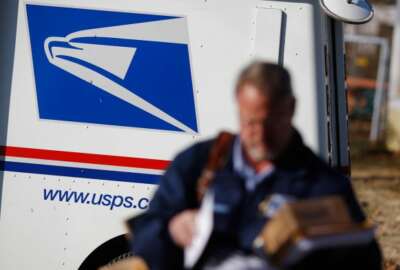

Hubbard Radio Washington DC, LLC. All rights reserved. This website is not intended for users located within the European Economic Area.
Postmaster General Louis DeJoy is defending operational changes at the Postal Service made before and during his tenure that have been put on hold by several f...
Postmaster General Louis DeJoy is defending operational changes at the Postal Service, made before and during his tenure, that have been put on hold by several federal judges within the past week.
While plans to remove mail-sorting equipment from processing plants predate his time in office, DeJoy said Thursday that some of the more than 700 machines targeted for removal only operated at 35%-40% of their total capacity and were inefficient to keep in use.
“There are experts in the field that understand our capacity to process mail. These machines are costly to keep up at that type of utilization, and those decisions were made at the field level and have been ongoing. I heard about sortation machines when I read about it in the newspaper,” DeJoy said in a virtual conversation hosted by the Economic Club in Washington, D.C.
The Postal Service is at the center of nearly a dozen federal lawsuits focused on ensuring on-time delivery of ballots and other election mail ahead of the November election.
A federal judge in Washington state last week blocked policy changes at the agency that have led to trucks leaving mail-processing plants on time, even if there is more mail to load onto them.
According to court filings from Justice Department attorneys representing the Postal Service, USPS officials worked over this past weekend to develop guidance that would implement the court’s order and clarify the agency’s policies on “related issues.”
As of Sept. 18, USPS headquarters has also approved “all requests” sent to its director of processing operations to reconnect mail-sorting machines.
But the attorneys have also asked the court to clarify its ruling around a few points, such as when USPS not running its trucks on time “would result in an overall degradation of the Postal Service’s timely mail delivery operations.”
A broad reading of the court’s injuction, they warn, “would impose serious harm on the Postal Service and its ability to deliver the mail, resulting in delays that would be contrary to the goals that Plaintiffs expressly seek to obtain through this litigation.”
In a House Oversight and Reform Committee hearing last month, DeJoy said cutting late and extra trips wasn’t an operational change, but was simply adhering to existing goals to deliver mail on-time.
“I would not know how to reverse that,” DeJoy said during the hearing. “Am I to say don’t run the trucks on time?”
This week, another judge in New York ordered USPS to pre-approve overtime necessary in the week leading up to Election Day, and ordered the agency to come up with a plan detailing all the “necessary” steps to reverse mail delays.
USPS last month suspended some operational changes, such as the removal of mail-sorting equipment and mailboxes, as well as cutting hours of operation at post offices to avoid, as DeJoy said, “even the appearance of an impact on election mail.”
DeJoy said the Justice Department has consulted the USPS legal team and is reviewing the courts’ decisions to decide its next steps.
“We are in negotiations with them, and hopefully we will come to a conclusion without having to appeal them,” he said. “We are prepared and committed to deliver election mail and that these rulings are really not necessary, but at the end of the day, we abide by the law and decisions will be made between us and the Justice Department whether we appeal them or not,” he said.
The rulings also directed the Postal Service to deliver all election mail at or above first-class mail standards, but DeJoy said that’s been a longstanding practice that the agency will maintain in the weeks ahead of the upcoming election.
“In many cases, we treat ballots with a higher priority than first-class mail, and we will maintain the processes that we have always in the past, which is if we see a ballot, we want to get it through the system and get it delivered quickly,” he said.
While the Postal Service has been under intense scrutiny in the lead-up to Election Day, DeJoy has called on Congress and the Postal Regulatory Commission to work with him to fix the agency’s long-term business model. Part of the challenge, he added, is meeting the Postal Service’s legal obligation to cover its costs while still delivering mail to every address in the country six days a week.
“That is an inefficient thing, a private-sector business would not be able to do that. We deliver mail on mules in the Grand Canyon and on small airplanes up in Alaska each day. But that’s our mission and I’m a defender of that and believe in that, I think that long term, that’s our strength,” he said.
After the election, DeJoy said the Postal Service will drill down on operational inefficiencies that will save “real dollars” and help the agency become more sustainable.
Just before DeJoy came into the office, the agency had briefed Congress that it was on track to lose $20 billion from pandemic-related losses and run out of cash by the end of September. While the agency has secured a $10 billion loan in the CARES Act and now has enough money to operate through August 2021, DeJoy said there was no clear path to keep the agency solvent when he took office.
As a former logistics executive, however, DeJoy said he saw late and extra trips between mail processing plants and post offices as a logical place to cut costs.
“This is the essence, the key attribute of running our network. If our trucks don’t run on time, downstream processes, which are our mail carriers, don’t run on time, and our plants don’t produce to a schedule, and it creates chaos and additional costs,” he said.
DeJoy said he has asked Congress and the Treasury Department for $7 billion-$10 billion to recoup some of its operating expenses during the pandemic, where it saw a dramatic drop in mail volume, but he said the agency doesn’t need the $25 billion in funding that the House had tried to advance in coronavirus spending bills.
“We take pride in the whole self-sustaining objective here at the organization, so we’re not looking for handouts. We’re on a self-improvement mission here right now … If they just gave us money, we’d be back in two years, whatever the amount is. Unless we have some fundamental change to our business model, we have a broken business model, and we need to change that,” he said.
DeJoy said more than 10,000 USPS employees have contracted COVID-19, and about 2,000 employees are currently out of work because of the coronavirus. The agency, which has more than 600,000 employees, has seen 91 employees’ deaths from the coronavirus.
DeJoy also defended the agency’s decision to send a postcard to households that was meant to be a “general statement to the public” about requesting mail-in ballots, but listed deadlines that were inaccurate for some states. The state of Colorado filed a lawsuit that led to a ruling that blocking the mailing of that postcard.
“It was a high-level message. In some cases, it wasn’t high enough and it conflicted with a couple of the states, and that’s where we got some of the complaints,” DeJoy said.
“The Postal Service is the most stable part of our mail-in vote process over the last several years,” he added. “Our processes have been the same, delivery times and so forth have been the same, and our message has been the same. It’s basically, ‘Vote early.’ You don’t send your Mother’s Day card on Mother’s Day if you want her to get it before Mother’s Day.”
Copyright © 2024 Federal News Network. All rights reserved. This website is not intended for users located within the European Economic Area.
Jory Heckman is a reporter at Federal News Network covering U.S. Postal Service, IRS, big data and technology issues.
Follow @jheckmanWFED


